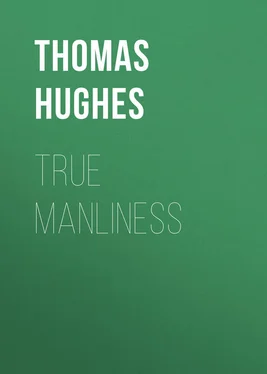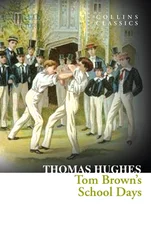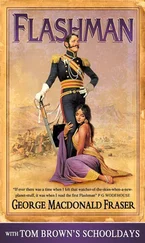Thomas Hughes - True Manliness
Здесь есть возможность читать онлайн «Thomas Hughes - True Manliness» — ознакомительный отрывок электронной книги совершенно бесплатно, а после прочтения отрывка купить полную версию. В некоторых случаях можно слушать аудио, скачать через торрент в формате fb2 и присутствует краткое содержание. ISBN: , Жанр: foreign_prose, на английском языке. Описание произведения, (предисловие) а так же отзывы посетителей доступны на портале библиотеки ЛибКат.
- Название:True Manliness
- Автор:
- Жанр:
- Год:неизвестен
- ISBN:http://www.gutenberg.org/ebooks/52534
- Рейтинг книги:5 / 5. Голосов: 1
-
Избранное:Добавить в избранное
- Отзывы:
-
Ваша оценка:
- 100
- 1
- 2
- 3
- 4
- 5
True Manliness: краткое содержание, описание и аннотация
Предлагаем к чтению аннотацию, описание, краткое содержание или предисловие (зависит от того, что написал сам автор книги «True Manliness»). Если вы не нашли необходимую информацию о книге — напишите в комментариях, мы постараемся отыскать её.
True Manliness — читать онлайн ознакомительный отрывок
Ниже представлен текст книги, разбитый по страницам. Система сохранения места последней прочитанной страницы, позволяет с удобством читать онлайн бесплатно книгу «True Manliness», без необходимости каждый раз заново искать на чём Вы остановились. Поставьте закладку, и сможете в любой момент перейти на страницу, на которой закончили чтение.
Интервал:
Закладка:
“There I lived for two years and upwards pleasantly enough, for several old school and college friends had chambers in the neighborhood. My engagement was a constant stimulus to work and economy, and made me indifferent as to society. I just visited two or three family friends on Sundays, and for the rest did very well without it. From my own experience I would have every youngster get engaged by the time he is twenty-one, though I am not prepared to maintain that a long engagement is so good for girls as for boys. Mine at any rate was the making of me. My democratic instincts grew in strength during these years, notwithstanding the failure of my first practical endeavors to act up to them. One of these I will mention. Every house in the Square was entitled to a key of the five gardens, in which I spent most of the long summer evenings; and, seeing the number of ragged children who came round the railings and looked wistfully through at the lawns and beds within, I extended my privilege to them and used to let them in by the scores, and watch them tumbling on the grass and gathering the daisies with entire satisfaction. From the first, this outrageous proceeding greatly scandalized the Beadle, whose remonstrances I entirely disregarded, until at last a notice came from the Trustees of the Square that the key of No. 15would be called in. This threat so alarmed poor Mrs. Roxworthy that I was fain to promise amendment, and so ceased myself to frequent the gardens. At the end of thirty years a strong effort is being made, as you may see in the papers, to throw the gardens open; so I live in hopes before long of seeing my revenge on the ghost of the Beadle of my day.
“I read hard at the law, but it was very much against the grain, and my endeavors to master the subtleties of contingent remainders, executory devises, the scintilla juris , and all the rest of it, were only partially successful. I sometimes think I might have taken con amore to common law and to criminal business, but conveyancing and real property law had no attractions for me, beyond the determination, if I could, to make a living by them. I read with a very able conveyancer and kindly old gentleman, who did his best to impart the mysteries to some six pupils. He soon found where my strength, such as it was, lay, and employed me in the preparation of deeds – such as appointments of new Trustees, where the operative part was quite simple common form, but long statements of fact had to be made in the recitals. These I rather excelled at, and on the whole, by the time I was of standing to be called to the Bar, was probably about as fit for that ceremony as the average of my cotemporaries.
“Three months before it took place I was married, the probation which my wife’s parents had very properly insisted on, having expired at the beginning of 1847, and we being found entirely in the same mind after our three years of separation. Most of our friends thought us mad, as we started on the vast income of £400 a year. It was confidently foretold that we should be living on our friends or in the workhouse before long, which prophesies however were entirely falsified. We started in tiny lodgings, almost opposite the house we now live in, and always managed to pay our way in the worst of times. And though I admit the experiment was a risky one, I have never repented it.
“The year of my call, 1848, was the year of revolutions, and on the 10th of April I paraded, like the rest of respectable society, as a special constable, though with shrewd misgivings in my own mind that the Chartists had a great deal to say for themselves. In which belief I soon found sympathizers. Frederick Maurice had recently been appointed Chaplain of Lincoln’s Inn, and was gathering round him a number of young Barristers and Students, whom he was putting to work in their spare time at a ragged school, and visiting the poor in a miserable district near Lincoln’s Inn. Contact with our wretched clients soon made it clear to us that something more radical and systematic was needed to raise them to anything like independence. They were almost all in the hands of slop sellers, chamber masters, or other grinders of the faces of the poor. What could be done to deliver them? In the autumn, one of our number spent some time in Paris and came back full of the material and moral effects of association amongst the workmen there.
“We resolved to try the experiment and accordingly formed ourselves into a society for promoting Workingmen’s Associations, with Maurice as president. The idea grew on us apace, and soon called out an amount of enthusiasm which surprised ourselves. We were all busy men, tied to offices from ten till five, so we met at six in the morning and eight at night to settle our rules, and organize our work. We were all poor men too, but soon scraped together enough money to start our first Association. This we resolved should be a tailoring establishment, for which we could ourselves, with the help of our friends, find sufficient custom in the first instance. We had no difficulty in hiring good airy workshops, but how to fill them was the rub. We were now in communication with a number of poor workpeople, especially amongst the Chartists, and, to cut a long story short, started our Association with a slop-worker who had been in prison as manager, and some dozen associates of kindred opinions in the workroom.
“I needn’t trouble you with any details of the Christian Socialist movement, of which this was a beginning, and which made a great noise in the press and elsewhere at the time. It has survived any number of follies and failures, and has gradually spread till there is a union of Societies all over the kingdom, doing a work for our poorer classes which one can only wonder at and be thankful for.
“We wrote tracts, and started a small paper, ‘The Christian Socialist,’ and were soon at open strife with nearly the whole of our press, both the ‘Edinburgh’ and the ‘Quarterly’ condescending to bestow on us contemptuous, but very angry articles, in which they were joined by weeklies and dailies innumerable. But we were young, saucy, and so thoroughly convinced we were right that ‘we cared, shall I say, not a d – n for their damning.’
“Most of my friends looked very serious, and prophesied that my prospects at the Bar would be ruined by my crotchets, and indeed I was dreadfully afraid of this myself. But the state of things in England was so serious, and I was so thoroughly convinced of the necessity of work in this direction, that I couldn’t give it up. No doubt I lost some business by it, but other business came, as I was wonderfully punctual at Chambers and soon got to be friends with my few clients, who even got to pardon, with a shrug of the shoulders, the queer folk they often found there. And queer no doubt they were for a Chancery barrister’s chambers, as emissaries from the tailors’, shoemakers’, printers’, and builders’ Associations (we had a dozen of them going by this time) were often in and out about their rules and accounts and squabbles. I only remember one instance in which I really suffered. A dear old gentleman, a family friend of ours, had managed with much difficulty to persuade his solicitor to give me some business. That most respectable of men, head of a firm which could have made any young barrister’s fortune, arrived one afternoon at my chambers with a brief, and was asked by my clerk to sit down for a moment till I was disengaged. This he did, graciously enough, though no doubt with the thought ‘how little I could know my business to keep him waiting even for a moment,’ when my door opened, and a full-blown black person (lately from the West Indies in quest of advice and aid for the freedmen there) walked out. This was too much for my intending client, who hurried away, saying he would call again, but I never saw his brief or him.
Читать дальшеИнтервал:
Закладка:
Похожие книги на «True Manliness»
Представляем Вашему вниманию похожие книги на «True Manliness» списком для выбора. Мы отобрали схожую по названию и смыслу литературу в надежде предоставить читателям больше вариантов отыскать новые, интересные, ещё непрочитанные произведения.
Обсуждение, отзывы о книге «True Manliness» и просто собственные мнения читателей. Оставьте ваши комментарии, напишите, что Вы думаете о произведении, его смысле или главных героях. Укажите что конкретно понравилось, а что нет, и почему Вы так считаете.












